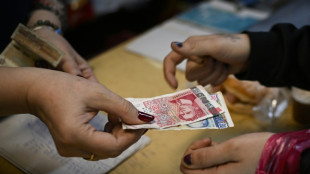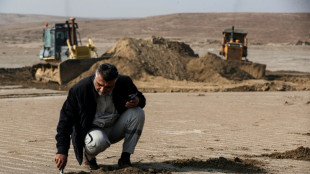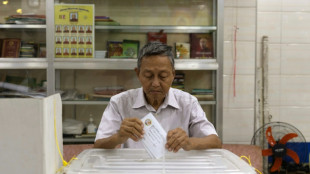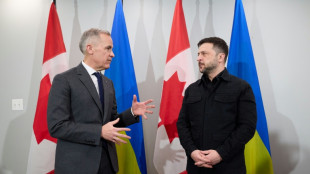
-
 'Unfair election': young voters absent from Myanmar polls
'Unfair election': young voters absent from Myanmar polls
-
Master Lock Comanche wins Sydney-Hobart ocean race for fifth time

-
 Bulgaria adopts euro amid fear and uncertainty
Bulgaria adopts euro amid fear and uncertainty
-
Giannis triumphant in NBA return as Spurs win streak ends

-
 How company bets on bitcoin can backfire
How company bets on bitcoin can backfire
-
Touadera on path to third presidential term as Central African Republic votes

-
 'Acoustic hazard': Noise complaints spark Vietnam pickleball wars
'Acoustic hazard': Noise complaints spark Vietnam pickleball wars
-
Iraqis cover soil with clay to curb sandstorms

-
 Australia's Head backs struggling opening partner Weatherald
Australia's Head backs struggling opening partner Weatherald
-
'Make emitters responsible': Thailand's clean air activists

-
 Zelensky looks to close out Ukraine peace deal at Trump meet
Zelensky looks to close out Ukraine peace deal at Trump meet
-
MCG curator in 'state of shock' after Ashes Test carnage

-
 Texans edge Chargers to reach NFL playoffs
Texans edge Chargers to reach NFL playoffs
-
Osimhen and Mane score as Nigeria win to qualify, Senegal draw

-
 Osimhen stars as Nigeria survive Tunisia rally to reach second round
Osimhen stars as Nigeria survive Tunisia rally to reach second round
-
How Myanmar's junta-run vote works, and why it might not

-
 Watkins wants to sicken Arsenal-supporting family
Watkins wants to sicken Arsenal-supporting family
-
Arsenal hold off surging Man City, Villa as Wirtz ends drought

-
 Late penalty miss denies Uganda AFCON win against Tanzania
Late penalty miss denies Uganda AFCON win against Tanzania
-
Watkins stretches Villa's winning streak at Chelsea

-
 Zelensky stops in Canada en route to US as Russia pummels Ukraine
Zelensky stops in Canada en route to US as Russia pummels Ukraine
-
Arteta salutes injury-hit Arsenal's survival spirit

-
 Wirtz scores first Liverpool goal as Anfield remembers Jota
Wirtz scores first Liverpool goal as Anfield remembers Jota
-
Mane rescues AFCON draw for Senegal against DR Congo

-
 Arsenal hold off surging Man City, Wirtz breaks Liverpool duck
Arsenal hold off surging Man City, Wirtz breaks Liverpool duck
-
Arsenal ignore injury woes to retain top spot with win over Brighton

-
 Sealed with a kiss: Guardiola revels in Cherki starring role
Sealed with a kiss: Guardiola revels in Cherki starring role
-
UK launches paid military gap-year scheme amid recruitment struggles

-
 Jota's children join tributes as Liverpool, Wolves pay respects
Jota's children join tributes as Liverpool, Wolves pay respects
-
'Tired' Inoue beats Picasso by unanimous decision to end gruelling year

-
 Thailand and Cambodia declare truce after weeks of clashes
Thailand and Cambodia declare truce after weeks of clashes
-
Netanyahu to meet Trump in US on Monday

-
 US strikes targeted IS militants, Lakurawa jihadists, Nigeria says
US strikes targeted IS militants, Lakurawa jihadists, Nigeria says
-
Cherki stars in Man City win at Forest

-
 Schwarz records maiden super-G success, Odermatt fourth
Schwarz records maiden super-G success, Odermatt fourth
-
Russia pummels Kyiv ahead of Zelensky's US visit

-
 Smith laments lack of runs after first Ashes home Test loss for 15 years
Smith laments lack of runs after first Ashes home Test loss for 15 years
-
Russian barrage on Kyiv kills one, leaves hundreds of thousands without power

-
 Stokes, Smith agree two-day Tests not a good look after MCG carnage
Stokes, Smith agree two-day Tests not a good look after MCG carnage
-
Stokes hails under-fire England's courage in 'really special' Test win

-
 What they said as England win 4th Ashes Test - reaction
What they said as England win 4th Ashes Test - reaction
-
Hong Kongers bid farewell to 'king of umbrellas'

-
 England snap 15-year losing streak to win chaotic 4th Ashes Test
England snap 15-year losing streak to win chaotic 4th Ashes Test
-
Thailand and Cambodia agree to 'immediate' ceasefire

-
 Closing 10-0 run lifts Bulls over 76ers while Pistons fall
Closing 10-0 run lifts Bulls over 76ers while Pistons fall
-
England 77-2 at tea, need 98 more to win chaotic 4th Ashes Test

-
 Somalia, African nations denounce Israeli recognition of Somaliland
Somalia, African nations denounce Israeli recognition of Somaliland
-
England need 175 to win chaotic 4th Ashes Test

-
 Cricket Australia boss says short Tests 'bad for business' after MCG carnage
Cricket Australia boss says short Tests 'bad for business' after MCG carnage
-
Russia lashes out at Zelensky ahead of new Trump talks on Ukraine plan


Experts sceptical that China travel curbs will be effective
International measures on travellers from China will likely have little effect on containing Covid, health experts said Tuesday, pointing to a surging variant in the United States that may pose a larger threat.
More than a dozen countries have imposed testing requirements on visitors from China, citing concerns about a lack of transparency in Beijing's infection data and the risk of a new variant of the virus emerging.
China -- which is experiencing an explosion of cases after lifting its long-standing zero-Covid measures -- has branded the restrictions "unacceptable" and vowed to take countermeasures.
- Why the new restrictions? -
China has officially recorded just a handful of deaths from the virus in recent days -- but with the end of mass testing and the narrowing of criteria for what counts as a Covid fatality, those numbers are no longer believed to reflect reality.
Hospitals and crematoriums have been overwhelmed, prompting global concern over the surge in cases.
Countries who have imposed testing measures, including the US and France, raised fears that the huge number of potential cases among China's 1.4 billion population could allow the virus to mutate into new variants.
Several of the countries have announced PCR tests on arrivals from China, which when sequenced could allow authorities to track possible new variants.
- Are they justified? -
The EU's health agency ECDC last week called bloc-wide tests on travellers from China "unjustified" given Europe's high levels of immunity from vaccination and prior infection.
However France, Italy and Spain have already started requiring tests, and EU nations will hold a crisis meeting on the subject on Wednesday.
French epidemiologist Mahmoud Zureik told AFP that such measures were "justified if an unprecedented wave sweeps through the country: it would be difficult to let a plane land with one out of every two people positive without doing anything."
But he added that for such measures to be useful in Europe, "they should at least be applied throughout the Schengen area" which comprises 27 EU states.
Dominique Costagliola, another French epidemiologist, was more critical.
Given that France is currently reducing its sequencing capacity on its home turf, testing arrivals from China seems little more than a "communication" exercise, she told AFP.
"It is not very useful apart from giving the impression that we are doing something," she said.
Even France's Covid expert committee, which recommended the government impose Covid screenings, said the measure was unlikely to delay the spread of infections or variants from China.
"The restrictions imposed on South Africa during Omicron's emergence in late 2021 had very little impact on the outbreak's evolution in Europe," the committee pointed out last week.
- Where is the new variant threat? -
In recent months a range of different Omicron subvariants have been competing for dominance across the globe.
Chinese health experts said recently that BA.5.2 and BF.7 are most prevalent in Beijing, both of which have already been overtaken by more transmissible subvariants in Western nations.
So even if they are introduced to Western nations from China, "border controls will not have much impact on these variants," said Paul Hunter, professor of medicine at the UK's University of East Anglia.
Rather than looking towards China, many virus experts have their attention on the US and the Omicron subvariant XBB.1.5.
Since mid-December, XBB.1.5 has jumped from under 10 percent of all national cases to over 40 percent, according to the US CDC's variant tracker.
Hunter said that "the main future concern for the UK at present is the XXB.1.5 variant, which was probably introduced into the UK from the United States and is now increasing".
- Can the variants be kept out? -
Tom Wenseleers, an evolutionary biologist at Belgium's Leuven University, tweeted that random sampling of arrivals from across the globe "would probably be more useful than just checking Chinese travellers".
"Can we keep new variants out?" asked Oxford University's James Naismith.
"This has not been possible to date in the UK and there is no evidence this is plausible for the UK," he said.
While there are concerns about XBB.1.5, US virologist Angela Rasmussen tweeted that it was not an "apocalyptic 'super variant'."
She pointed to recent research indicating that a booster dose of a new bivalent vaccine would produce neutralising antibodies against XBB.1.5.
M.A.Colin--AMWN



